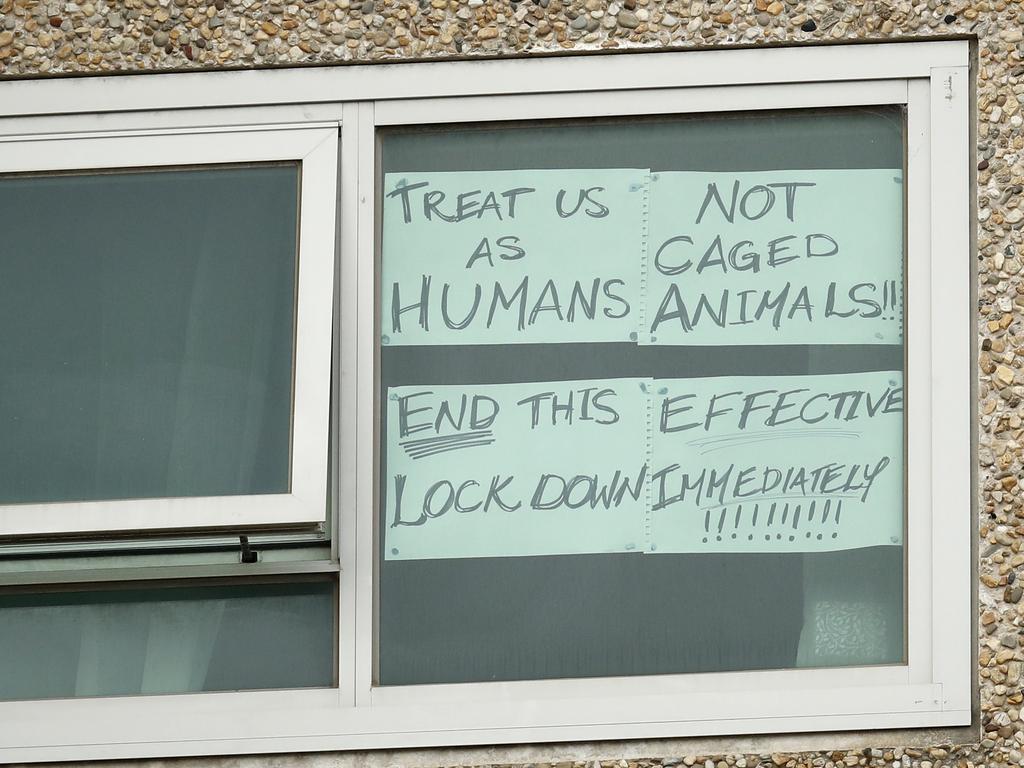Coronavirus Australia: ‘No apology for saving lives’: Andrews minister responds to finding lockdown violated human rights
Residents of public housing towers locked down by the Andrews government say they agree with an Ombudsman’s report that found the government violated human rights laws.

Residents of public housing towers locked down by the Andrews government without warning in early July amid Victoria’s second wave of COVID-19 say they agree with an Ombudsman’s report that found the government violated human rights laws.
In a report tabled in state parliament on Thursday, Ombudsman Deborah Glass recommended the Andrews government apologise to the 3000 residents of nine public housing towers that were locked down in North Melbourne and Flemington, finding that while the lockdown was necessary and effective, the government acted contrary to health advice in locking the towers down without warning and without lead time to allow for the timely supply of essential items such as food.
Housing Minister Richard Wynne made it clear no such apology would be forthcoming, despite acknowledging residents’ distress. “We make absolutely no apology for saving people’s lives,” Mr Wynne said.
“I can say absolutely that we have learnt the lessons of the work that we did in relation to the intervention in the towers, but we absolutely do not support the recommendation that suggests that we acted illegally. We did not act illegally.”
Asked if he had received legal advice that apologising for the lockdown may have legal ramifications for the Andrews government, Mr Wynne said: “I have no advice to that effect.”
Premier Daniel Andrews held his first press conference in a week minutes before Ms Glass’s report was publicly released on Thursday morning, leaving Mr Wynne — who was not present at the Crisis Council of Cabinet meeting where the decision was made to lock down the public housing towers — to front the media at a later press conference.
Mr Wynne was accompanied by Deputy Chief Health Officer Allen Cheng, who played no role in the tower lockdown because he did not replace his predecessor until weeks after it occurred.
Under one of the harshest lockdowns in the world, residents were prevented by police from leaving their flats for any reason.
What was established as an indefinite lockdown on July 4 came to an end five days later in eight of the nine towers, but residents of 33 Alfred Street in North Melbourne — where just over 10 per cent of residents contracted the virus — spent two weeks unable to leave their building.
North Melbourne towers resident Amina Ahmed, 19, was locked down with her parents and two younger siblings in their three-bedroom apartment. “It was hard because a lot of us go out a lot every day … and we had to stay at home and not get any fresh air at all,” she told The Australian.
“There was not enough (warning) time. We found out when the media came and all of a sudden there were police outside.”
Sri Tassam said she was completely isolated because her son was visiting his father when her North Melbourne tower was locked down. “It was very hard,” the 45-year-old said. “I was feeling crazy and thinking, ‘What’s going on?’. It was scary. I was alone.”
Alfred Street resident Barry Berih said the lockdown was “disgusting” and it was “terrible for the government to do this to us”.
“People who (live here) have come from war-torn countries and moved here. For us it wasn’t just about COVID-19, it was about respect … we are not criminals,” the 26-year-old youth worker said. “It was traumatising seeing all the police, about 500 police.”
Delivering her report, Ms Glass said the “immediacy” of the lockdown, which saw residents locked in their flats without warning, was “not compatible with the residents’ human rights, including the right to humane treatment when deprived of liberty”.
“It appears to me to be contrary to Victorian law, specifically the Charter of Human Rights and Responsibilities Act,” she said.
“The government need not apologise for taking necessary and difficult action to keep us all safe in the face of this pandemic, but the rushed decision to detain 3000 people immediately did not appear to have been taken on such health advice.
“Among my recommendations are that the Victorian government apologise to the people detained in the public housing estates for the harm and distress caused by the immediacy of their lockdown,” Ms Glass said.
Deputy Chief Health Officer Annaliese van Diemen, who was acting as CHO on the day of the lockdown, told Ms Glass’s investigation that she did not believe delaying the lockdown by a day “would’ve made a hugely significant difference to the longer-term epidemiology” of the coronavirus outbreak in the towers.







To join the conversation, please log in. Don't have an account? Register
Join the conversation, you are commenting as Logout